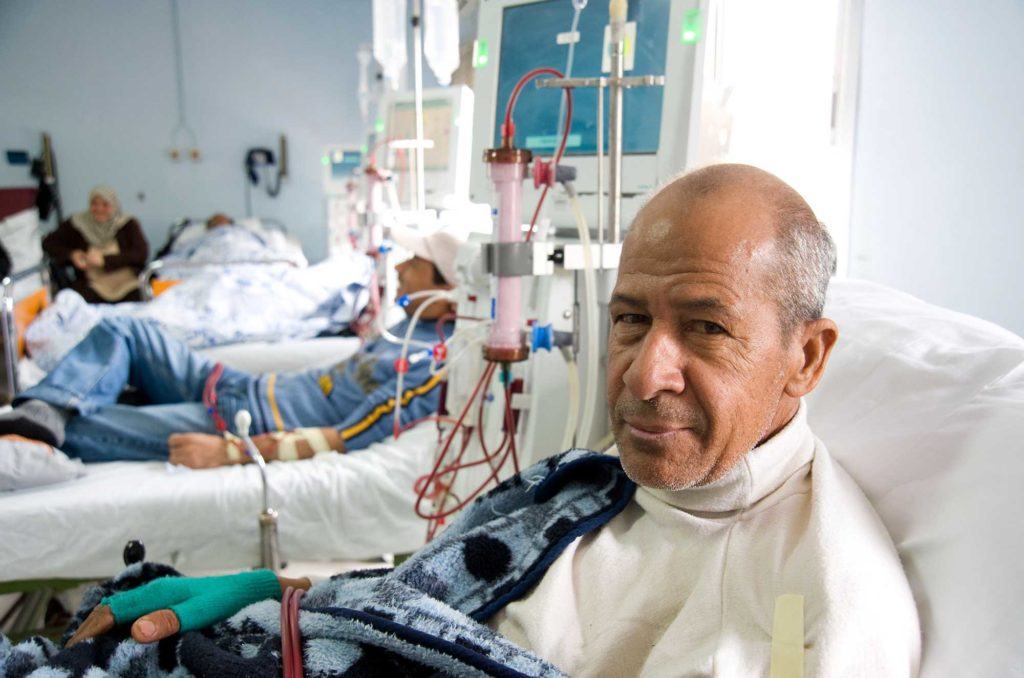Emergency Appeal for Dialysis Medicine in Lebanon
Posted in: About Anera
Medicines that dialysis patients need to survive are in dangerously short supply in Lebanon. Anera supports seven healthcare organizations that provide dialysis treatment in Lebanon. Combined, 636 dialysis patients rely on their services. Our medical donations team reached out to them to assess the situation confronting hemodialysis patients and to develop a comprehensive plan to fill their needs for medicines.


End-stage Renal Disease
Once diagnosed with end stage renal disease, patients can expect to continue lifelong dialysis treatment. They are required to undergo three- to four-hour-long hemodialysis sessions three times a week. As depressing as that may seem, the situation for hemodialysis patients in Lebanon is even worse. Patients are frustrated, anxious, tired, and worried about their survival and dependency in the current economic crisis in Lebanon. The ministry of health is unable to subsidize these life-saving medicines due to the economic crisis.
The Economy in Lebanon
The Lebanese pound has deteriorated since 2019 as a result of years of state corruption and unsustainable fiscal policies. It is currently depreciated by more than 96% against the US dollar. An article published by Reuters on September 14, 2022, states that poverty rates in Lebanon have sky-rocketed with around 80% of people now classified as poor.
Lebanon’s Energy Supply
Homes get only two to three hours of electricity every day. And backup generators are now considered a luxury. Fuel shortages and accompanying price hikes mean that the costs to run generators have risen tenfold and are currently averaging more than the minimum wage in Lebanon.
Quality of Life for Dialysis Patients
Dialysis therapy is expensive, time-consuming, and requires dietary restrictions. Long-term dialysis itself often entails a loss of freedom; dependence on caregivers; disruption of marital, family, and social life; and reduced or loss of financial income. The resulting physical, psychological, socioeconomic, and environmental consequences of this disease lead to a compromised quality of life.
Medicine Shortages
Securing medicines for hemodialysis sessions is a daily challenge for hospitals in Lebanon. Cost and supply issues can sometimes lead to skipping dialysis sessions, which can be fatal. We have seen cases of patients getting only the most essential medications for dialysis as they attempt to rationalize and prioritize their treatment decisions. And, ideally, end-stage renal disease patients take vitamins and concurrent treatments for chronic diseases such as hypertension and diabetes.
Transportation Costs
Patients also struggle to reach hemodialysis centers due to the high cost of transportation. The estimated cost of traveling to and from dialysis centers is approximately 2,400,000 Lebanese pounds per week – over 50% of the average normal monthly wage!
How to Help
Technically, dialysis sessions are covered by the Lebanese government. But the funds have been delayed for over two years and hospitals are left to bear these costs. The head of the Lebanese society of nephrology and hypertension reported that hospitals are witnessing national shortages of erythropoietin, an essential hormone used to treat renal failure patients. Without it, they suffer from anemia.
Case study Rafik Hariri University Hospital: The Rafik Hariri Hospital performs dialysis for 151 patients and the situation is becoming critical due to shortages. Patients are either not taking erythropoietin at all or they are taking lower doses and suffering from a low red blood cell count. The ministry of health assures the public via social media that patients will not be deprived of their treatment, but hospitals are reaching a point where they will not be able to provide dialysis because of delays in funding and medicine shortages.
Anera is looking for support to secure essential medications for dialysis sessions at Safad Hospital, Hamshari Hospital, Mercy Corps, Ghawth for Relief and Emergency, Rafik Hariri University Hospital, Orange Nassau Governmental Hospital, and Nabatieh Governmental Hospital. This is what they need:


OUR BLOG
Related
In this log, Anera provides updates on unfolding war in Palestine and our response. Please stay tuned here for the latest information. To subscribe for weekly updates via SMS on our response in Gaza, text GAZA to 1-866-549-0055. Questions? See…
Today, two of Anera’s staff in Gaza, Sami Matar and Ahmad El-Najjar, described some impressions of conditions there now. It took Sami, our program manager, three hours today to travel from the Anera office in Gaza City to Mawasi, Khan…

